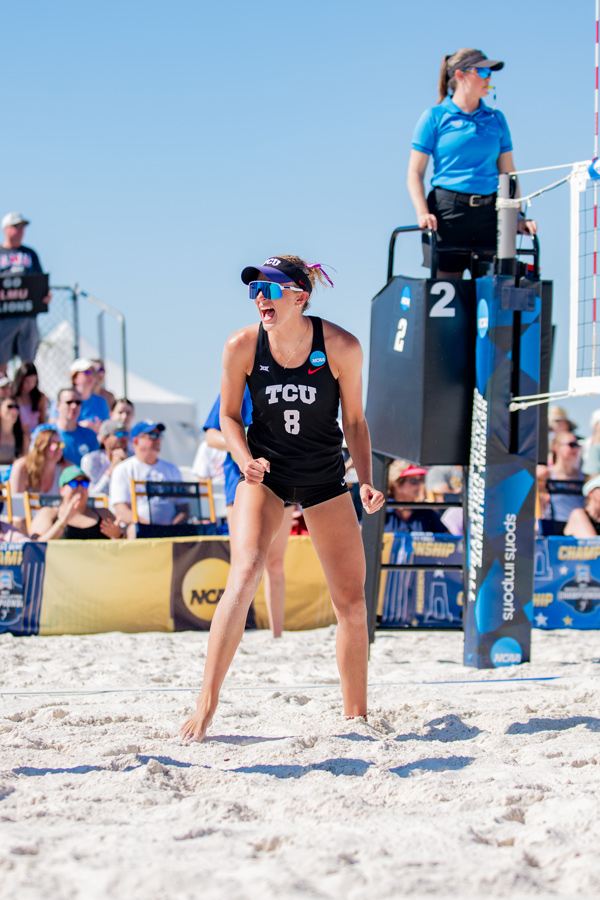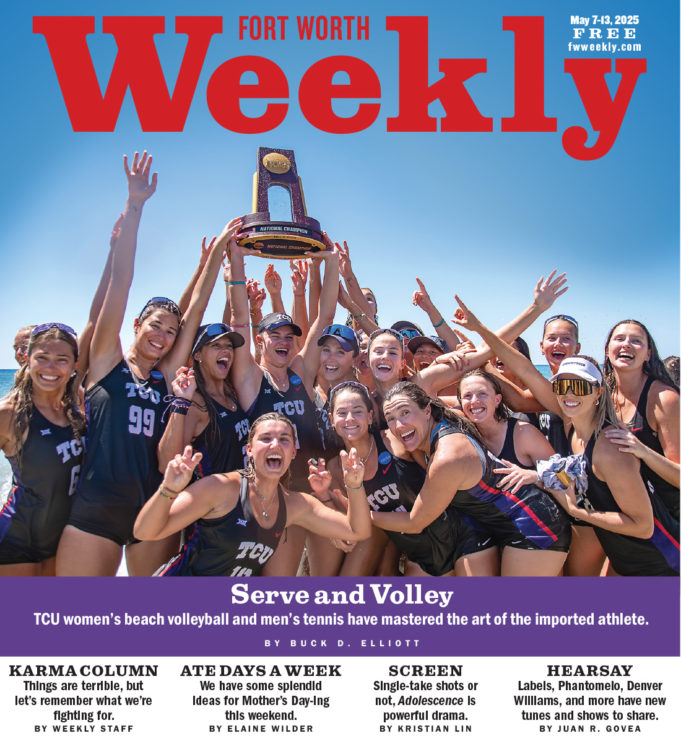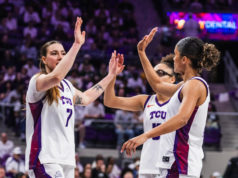The Luka trade, the Stars’ Stanley Cup hopes, and the usual disappointment over the Cowboys’ draft have dominated local spring sports headlines. Fort Worthians, specifically, are sitting satisfied with TCU women’s basketball’s historic dribble to an Elite Eight finish, but two elite squads clad in purple have been mowing down opponents on their way to championships, one in the bag, the other in the works.
TCU women’s beach volleyball, which celebrated a decade of existence this season, enjoyed sharing the anniversary with their first national championship this weekend. The program, which didn’t win a match in its inaugural season, has been greatness-adjacent for the last five years, having reached the semifinals of the tournament twice. The championship tournament crowned the Horned Frogs as their ninth-ever champion (the 2020 season was cancelled), and the Funkytowners are the only squad to ever hoist the trophy that didn’t have a Bruin or a Trojan as their mascot. USC has won six championships, and their crosstown rival UCLA grabbed two back-to-back in 2018 and 2019, respectively.
The Frogs were dominant on the Gulf Shores of Alabama as they bumped, set, and spiked all over Georgia State and Texas with three wins and no losses to clinch each match. TCU then downed Cal Poly 3-1 en route to the championship spat. Their final opponent, fourth-seeded Loyola Marymount, had underdogged their way through both of their perennial-favorite-L.A.-based neighbors — USC and UCLA — on their way to a contentious loss to the Frogs 3-2. The final pairs to finish were the only three-set contest, in which the Frogs thundered back with a convincing 15-6 final game after dropping the first and buying themselves a lifeline in the second. The overall win delivered the first team championship for TCU women’s athletics outside of Rifle (who possess four titles) since golf won the whole shebang in 1983, which was the first in the history of the university.
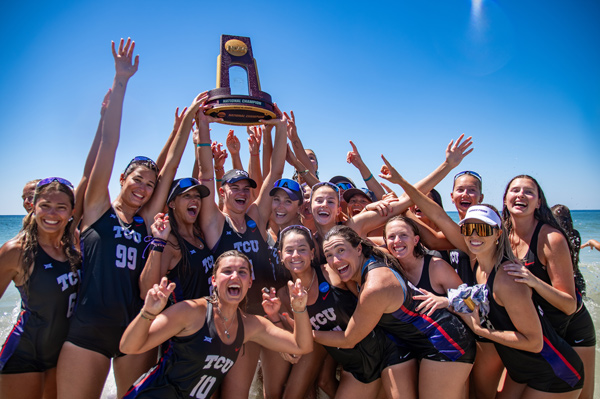
Courtesy TCU Athletics
TCU men’s tennis has become the standard to be measured against in college tennis, and similar to beach volleyball, they are usurping programs like USC, which was the previous keeper of the gold. David Roditi’s tenure has been nothing less than masterful, and the Frogs are in position to defend their outdoor national championship from last season.
Tennis and beach volleyball as sports are similar in that they both aggregate individual matchups to make up a team score. In collegiate tennis, three doubles matches account for one overall point (whomever wins two of the three takes the lone doubles point) before six singles matches comprise the rest, the first to reach four points prevailing. The NCAA tournament seeds via Intercollegiate Tennis Association (ITA) rankings, and the Frogs are second behind Wake Forest, to whom the Frogs fell 3-4 during the Indoor National Championships in February. TCU has appeared in the last four indoor championship finals, winning their first two and falling last year to Ohio State and this year to the Demon Deacons. This year’s squad has only three losses this season, to the aforementioned Wake Forest, third-ranked Texas, and Central Florida, but are flawless on the purple courts.
As the second seed, the Frogs hosted a regional at TCU this past weekend, where they sliced past Abilene Christian without dropping a match before winning against a pluckier-than-anticipated 24th-ranked Oklahoma. Roditi’s squad easily took the Big 12 regular season championship this season — easy because third-ranked Texas is now in the SEC and Baylor has fallen from the prominence they’d enjoyed proximally before the pandemic. That said, the Frogs found themselves banged up and injured at a particularly inopportune time and lost the conference tournament in the finals to Central Florida 3-4, who are now 15th-ranked and will visit Bayard H. Friedman Tennis Center at noon on Saturday for a super-regional match.
Tennis rankings — both for individuals and teams — are heavily influenced by Universal Tennis Rating (UTR), which is a proprietary algorithm that ranks players based on scores with opponents over time, as well as the future performance of those participants. As someone who works in the tennis world, it’s frighteningly accurate. Normal chaos factors still exist (though far less in tennis compared to true team sports), but the projected rankings tend to hold true in many instances in which there is any appreciable separation. The Frogs are ahead of the Knights both in team rankings and the individual matchups that are likely to materialize, though the fancy computers cannot account for when an individual may not play their best due to injury or otherwise.
These Frogs know how to win. Lui Maxted and Pedro Vives have won a national team championship of some kind for the last three years and along with Jack Pinnington are all ranked in the Top 40 players in the nation. TCU’s roster has the firepower to return to the NCAA championship, which will be held in Waco at Baylor this season, though the Bears were already eliminated by Texas A&M.
Aside from stellar coaching and athletes, how have these relatively small TCU athletic programs become such powerhouses in recent years? Utilizing foreign weaponry. Both Roditi and Hector Gutierrez were born outside the United States. Roditi is from Mexico City, and Gutierrez is native to the Canary Islands. They each have professional backgrounds in their sports and experience playing in professional circuits overseas or at least outside of U.S. borders. Of the six volleyball athletes who won their finals matches, four are from Spain and one from Ukraine, and the only American hails from Puerto Rico. Roditi has built a dynamic roster with only one native-born son, Cooper Woestendick, a freshman and Top-5 recruit in the nation last year who has been active in the junior circuit, Junior Wimbledon, and training at the national center while completing nontraditional school. The remainder hail primarily from Europe. In the easy-transfer-NIL era, the most surefire way to stay dominant is to be dominant. Development is still important, but players capable of success in these sports are arriving at an extremely high level and want to compete for championships right away. Roditi and Gutierrez have positioned their programs to compete for championships every year.
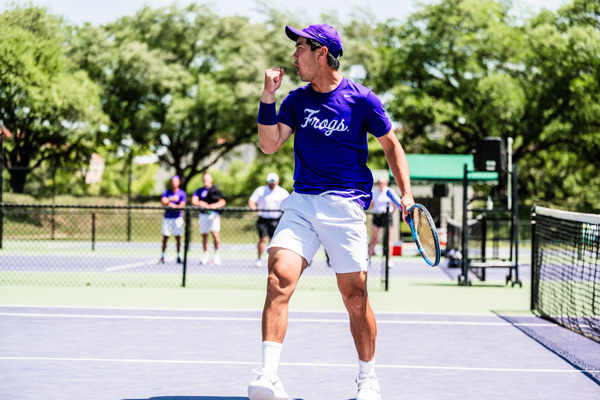
Courtesy TCU Athletics
